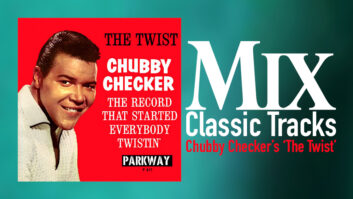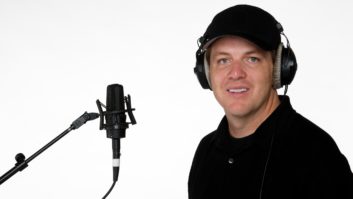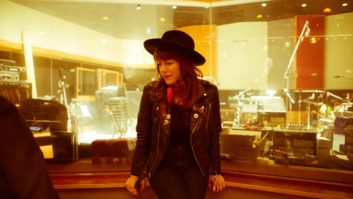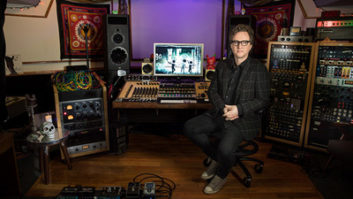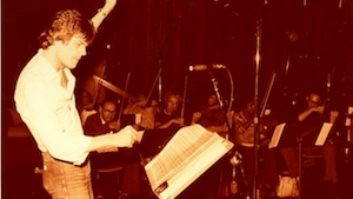
During the summer before my final semester of college, I managed to
talk my way into a highly sought-after internship at one of the biggest
studios on Nashville’s Music Row. I was excited because I was sure that
meant I would find hundreds of opportunities to sit in on sessions with
major-label artists and top-notch engineers working on cutting-edge
gear. Imagine my surprise one day when I was handed a tube of cookie
dough, a spatula and instructions on when to bring treats to the
in-session clients.
I remember standing there, utensil in hand, thinking about how only
moments before, I’d been invited by one of the aforementioned clients
to sit in on an orchestral tracking session. I protested the assignment
to the studio manager, pointing defiantly in the direction of the main
control room and asking why one of the other interns couldn’t handle
the odious task of baking and serving. I pointed out that the whole
purpose of internships is to give future engineers the opportunity to
learn. And that’s when the revelation hit me: She was giving me
a chance to learn, and the lesson being offered was far more important
than anything I could have picked up by watching an engineer’s hands
hovering over a console.
I always thought school was the first step down the road to becoming
an audio engineer. But in my years since graduation — while
accruing studio hours and experience, and while choosing and training
interns myself — I’ve come to the realization that school is
actually more like the little booster step that readies you for your
first step down that road. Don’t get me wrong; in the age of digital
audio, education is practically essential, whether in the form of
work-study, certification or a degree program. As computer skills
become crucial for virtually every stage of production, more and more
employers are looking for signs of education in potential new-hires.
There is simply so much to learn about the audio world that entry-level
engineers have to be conversant with topics like console theory,
principles of digital audio and the basics of signal flow before
setting foot inside a studio — even in an internship capacity
— which is why it may be startling for entry-level engineers when
they first discover that virtually none of their assigned tasks draw on
their expensive, hard-earned educations.
There is so much more to becoming an engineer than book learning and
practicum. We have to learn how to function in a professional studio
environment, how to interact with clients, how to appreciate the little
things it takes to make a facility appear as though it functions
effortlessly to those who pay for its services. And, most importantly,
we have to learn how to interact with senior staff.
Fresh-faced, eager new hires tend to feel their body of knowledge
bursting at the seams, and just about every one of us — at some
point or another — has countered a senior engineer’s instructions
with the phrase: “But in school…” It’s an impulse
that’s difficult to resist because we feel like we understand the hows
and whys, and we don’t see the point in beating ourselves over the head
with methodology. However, the senior staff is senior staff for good
reason. They’ve endured years of training and have paid their dues, and
while they can serve us by sharing invaluable nuggets of knowledge, we
can serve them by making their lives easier. That brings me to the
Golden Rule of assisting: The engineer’s word is gospel, at least while
you’re working for him or her. So much of audio production is
subjective and preference-oriented, but to the person on whose
shoulders the success of a project rests, there’s only one way to do
things. Live by that, and your senior staff will love you.
While working that very same internship where I baked cookies for
clients, I frequently ran setups and teardowns with the studio’s
resident second engineer. He and I repeatedly butted heads over the
issue of cable wrapping, because he insisted that all cables had to be
coiled right-handed, starting at the female end. I didn’t agree: I
figured over-under was the same regardless of which hand or which end
started. Eventually, he explained that he had a methodology for tossing
out cables that he felt was impacted by my left-handed wrapping. He
felt my refusal to comply adversely affected the efficiency of his
setup, and that in turn adversely affected his ability to perfectly
complete the session engineer’s setup. Even though I didn’t agree that
it mattered either way, I decided to do it his way, if only to keep the
peace. His whole demeanor lifted. Instead of wasting time debating the
merits of cable wrapping, he had the time and the inclination to share
seconding tips with me.
Although most entry-level gigs are more about attitude than
aptitude, becoming fluent on a wide variety of equipment is a pretty
good way to advance quickly. Arm yourself with a “yes sir, right
away sir” outlook and an encyclopedia-like knowledge of a
facility’s gear roster, and you’ll find yourself with more trust, more
responsibilities and one step closer to the work you wanted to do in
the first place. The question is how to best go about finding
opportunities to learn a facility’s gear.
I’ve interned and worked at huge facilities and tiny boutiques,
ranging from music studios to radio stations to post houses, and the
one thing I learned about the difference between them is that it’s much
more difficult to get gear time in a big, high-profile studio than in a
smaller house. Frequently, big studios are booked virtually nonstop,
and any downtime is filled with setup and teardown or held for senior
staff to work on private or smaller projects. Although the chance of
stumbling upon a big, exciting opportunity may be greater at a large,
infamous facility, the chance of actually sitting behind the console
may be greater at a smaller one. During my last internship in
Nashville, I chose a small two-room post house located off of Music
Row. I was the third person in a two-person operation, and in no time,
I found the engineer asking me to man Pro Tools while he watched over
my shoulder. Once I proved I had the right attitude, he was willing to
let me prove my aptitude and I developed Pro Tools skills I would have
never developed in a controlled school environment. The client list
might not have had the brag-factor of a larger studio, but the
experience I gained from hands-on opportunities put me far ahead of my
competition when I went out into the world looking for a paying
gig.
That said, it’s important to remember that the whole point of an
entry-level position is to develop an understanding of how studios
work, how to exist in the hierarchy of the industry and how to develop
the right attitude while proving, and improving, aptitude. So what are
the things we should all learn as we’re first starting out?
First: technology. Pay attention and follow up on topics that seem
suspiciously simple. Regardless of whether you intend to go into music
production, post-production, installation work or broadcasting, become
familiar with timecode issues, video decks, Pro Tools plug-ins and,
yes, even those antiquated analog open-reel tape machines. Learn about
ISDN, routing, patchbay basics and memorize a few commonly used
microphones. I once worked for an engineer who liked to rattle off a
list of required microphones only once, and he used the speed and
completeness of his second’s retrieval to gauge whether he would let
that person work for him again. Knowing model numbers paid off in that
instance.
Second: professionalism. While it may seem obvious, studios are
businesses, and as businesses, they rely on clients for revenue. For
many of us, part of the appeal of this industry is the idea of working
in a casual environment where the dress code is only slightly more
formal than that of a rock concert. However, there are many facilities
where the dress code is “business casual,” even for the
entry-level staff; it is better to dress up than to dress down until
you’re sure of what your employer expects. I recently trained a studio
assistant who liked to show up for work in ripped jeans and
safety-pin-riddled T-shirts. And while the head of audio didn’t mind
his casual attire, the head of the more conservative video department
worried about what clients would think when they saw him, and asked him
to please avoid client areas such as lobbies, lounges and hallways.
Unfortunately, with that as his first impression, he never found enough
opportunities to prove that he could excel despite his appearance.
Lesson learned: When in doubt, err on the side of conservatism.
Third: client/workplace etiquette. Understand that at any given
moment, there are hundreds of other entry-level engineers out there who
would be willing to do your work twice as hard for half the pay.
Understand, too, that any self-respecting studio manager won’t think
twice about canning you if you jeopardize an expensive, hard-won
relationship with a client. Because of that, always be aware of what
you say and do when you’re around a client. Be aware of your body
language, be careful not to dominate conversation, remember to be
polite and that a little subtle flattery never hurt anyone. I worked at
a facility where one client insisted on ¼-inch tape for all of his
dub orders. We hired a studio assistant whose first reaction to this
information was to turn to the client and say, “Really? I didn’t
think anyone was using ¼-inch anymore.” He meant no harm and
was just trying to make friendly small-talk, but the client took it as
an insult and later informed the department coordinator that he’d been
made to feel stupid. Luckily, he needed no more placating than a formal
apology, but I guarantee you, if it had come down to losing the client
or losing the assistant, the decision would have been simple. Likewise,
be aware of how you speak and act around senior staff. Making an
engineer feel like you doubt his or her methodology probably won’t win
you any favor. Better to be more respectful than necessary than not
respectful enough.
With the right combination of good attitude and good aptitude, an
internship or entry-level position can accelerate anyone toward bigger
and better opportunities. Enthusiasm is crucial, as is respect,
politeness and the sponge-like ability to absorb knowledge. With so
much competition in the job market, finding ways to stand out as the
best choice is what will put you ahead. And learning those ways can
only come from working your way up from the bottom. Education gets you
to the door, experience gets you in and learning from experience sends
you down the path to full-time engineering.
Sara A. Hughes is an Atlanta-based post-production engineer. She
graduated from Middle Tennessee State University’s Recording Industry
program in 1999.

Looking to expand your educational horizons? Click
here for Mix’s 15 classic tips for finding a school that’s right
for you.
